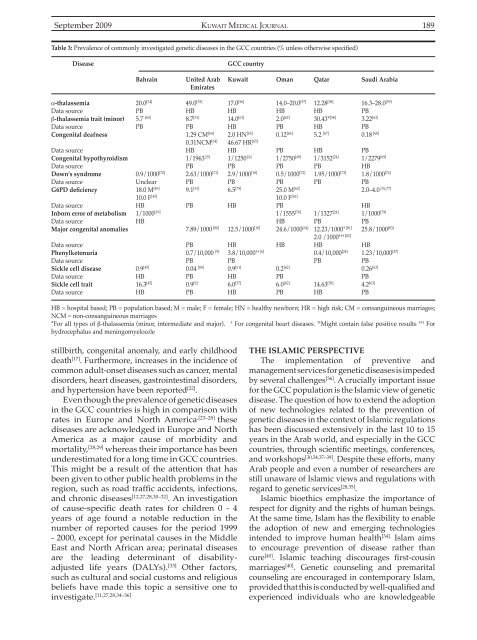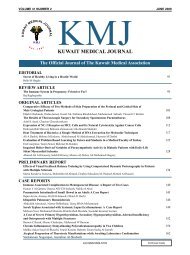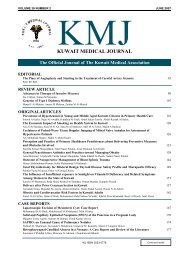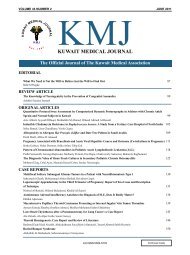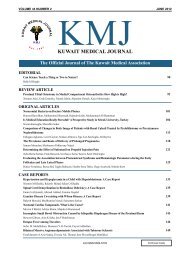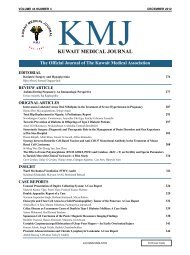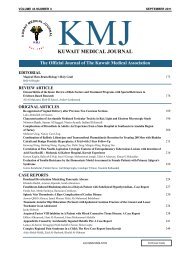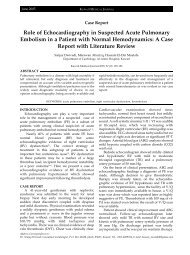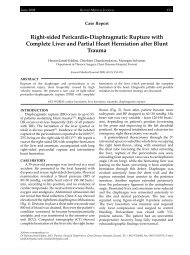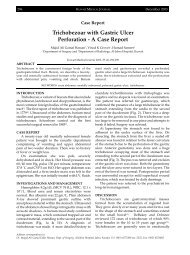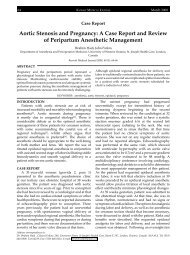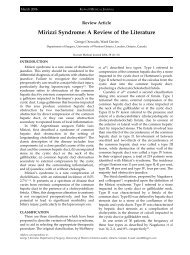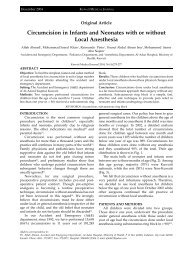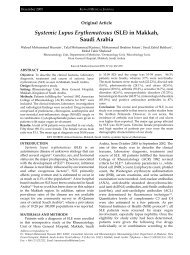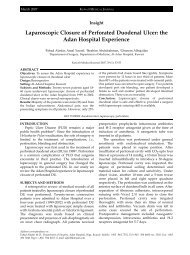Vol 41 # 3 September 2009 - Kma.org.kw
Vol 41 # 3 September 2009 - Kma.org.kw
Vol 41 # 3 September 2009 - Kma.org.kw
You also want an ePaper? Increase the reach of your titles
YUMPU automatically turns print PDFs into web optimized ePapers that Google loves.
<strong>September</strong> <strong>2009</strong><br />
KUWAIT MEDICAL JOURNAL 189<br />
Table 3: Prevalence of commonly investigated genetic diseases in the GCC countries (% unless otherwise specified)<br />
Disease<br />
GCC country<br />
Bahrain United Arab Kuwait Oman Qatar Saudi Arabia<br />
Emirates<br />
α-thalassemia 20.0 [54] 49.0 [55] 17.0 [56] 14.0–20.0 [57] 12.28 [58] 16.3–28.0 [59]<br />
Data source PB HB HB HB HB PB<br />
β-thalassemia trait (minor) 5.7 [60] 8.7 [51] 14.0 [61] 2.0 [62] 30.43* [58] 3.22 [63]<br />
Data source PB PB HB PB HB PB<br />
Congenital deafness 1.29 CM [64] 2.0 HN [65] 0.12 [66] 5.2 [67] 0.18 [68]<br />
0.31NCM [64] 46.67 HR [65]<br />
Data source HB HB PB HB PB<br />
Congenital hypothyroidism 1/1963 [9] 1/1250 [6] 1/2750 [49] 1/3152 [24] 1/2279 [69]<br />
Data source PB PB PB PB HB<br />
Down’s syndrome 0.9/1000 [70] 2.63/1000 [71] 2.9/1000 [18] 0.5/1000 [72] 1.95/1000 [73] 1.8/1000 [74]<br />
Data source Unclear PB PB PB PB PB<br />
G6PD deficiency 18.0 M [45] 9.1 [51] 6.5 [75] 25.0 M [62] 2.0–4.0 [76,77]<br />
10.0 F [45] 10.0 F [62]<br />
Data source HB PB HB PB HB<br />
Inborn error of metabolism 1/1000 [19] 1/1555 [78] 1/1327 [24] 1/1000 [79]<br />
Data source HB HB PB PB<br />
Major congenital anomalies 7.89/1000 [80] 12.5/1000 [18] 24.6/1000 [64] 12.23/1000 † [81] 25.8/1000 [83]<br />
††† [82]<br />
2.0 /1000<br />
Data source PB HB HB HB HB<br />
Phenylketonuria 0.7/10,000 [9] 3.8/10,000 †† [6] 0.4/10,000 [24] 1.23/10,000 [47]<br />
Data source PB PB PB PB<br />
Sickle cell disease 0.9 [45] 0.04 [84] 0.9 [61] 0.2 [62] 0.26 [63]<br />
Data source HB PB HB PB PB<br />
Sickle cell trait 16.3 [45] 0.9 [9] 6.0 [57] 6.0 [62] 14.63 [58] 4.2 [63]<br />
Data source HB PB HB PB HB PB<br />
HB = hospital based; PB = population based; M = male; F = female; HN = healthy newborn; HR = high risk; CM = consanguineous marriages;<br />
NCM = non-consanguineous marriages<br />
*For all types of β-thalassemia (minor, intermediate and major).<br />
†<br />
For congenital heart diseases. †† Might contain false positive results ††† For<br />
hydrocephalus and meningomyelocele<br />
stillbirth, congenital anomaly, and early childhood<br />
death [17] . Furthermore, increases in the incidence of<br />
common adult-onset diseases such as cancer, mental<br />
disorders, heart diseases, gastrointestinal disorders,<br />
and hypertension have been reported [22] .<br />
Even though the prevalence of genetic diseases<br />
in the GCC countries is high in comparison with<br />
rates in Europe and North America ,[23–28] these<br />
diseases are acknowledged in Europe and North<br />
America as a major cause of morbidity and<br />
mortality, [28,29] whereas their importance has been<br />
underestimated for a long time in GCC countries.<br />
This might be a result of the attention that has<br />
been given to other public health problems in the<br />
region, such as road traffic accidents, infections,<br />
and chronic diseases [12,27,28,30–32] . An investigation<br />
of cause-specific death rates for children 0 - 4<br />
years of age found a notable reduction in the<br />
number of reported causes for the period 1999<br />
- 2000, except for perinatal causes in the Middle<br />
East and North African area; perinatal diseases<br />
are the leading determinant of disabilityadjusted<br />
life years (DALYs). [33] Other factors,<br />
such as cultural and social customs and religious<br />
beliefs have made this topic a sensitive one to<br />
investigate. [11,27,28,34–36]<br />
THE ISLAMIC PERSPECTIVE<br />
The implementation of preventive and<br />
management services for genetic diseases is impeded<br />
by several challenges [36] . A crucially important issue<br />
for the GCC population is the Islamic view of genetic<br />
disease. The question of how to extend the adoption<br />
of new technologies related to the prevention of<br />
genetic diseases in the context of Islamic regulations<br />
has been discussed extensively in the last 10 to 15<br />
years in the Arab world, and especially in the GCC<br />
countries, through scientific meetings, conferences,<br />
and workshops [30,34,37–39] . Despite these efforts, many<br />
Arab people and even a number of researchers are<br />
still unaware of Islamic views and regulations with<br />
regard to genetic services [28,35] .<br />
Islamic bioethics emphasize the importance of<br />
respect for dignity and the rights of human beings.<br />
At the same time, Islam has the flexibility to enable<br />
the adoption of new and emerging technologies<br />
intended to improve human health [34]. Islam aims<br />
to encourage prevention of disease rather than<br />
cure [40] . Islamic teaching discourages first-cousin<br />
marriages [40] . Genetic counseling and premarital<br />
counseling are encouraged in contemporary Islam,<br />
provided that this is conducted by well-qualified and<br />
experienced individuals who are knowledgeable


